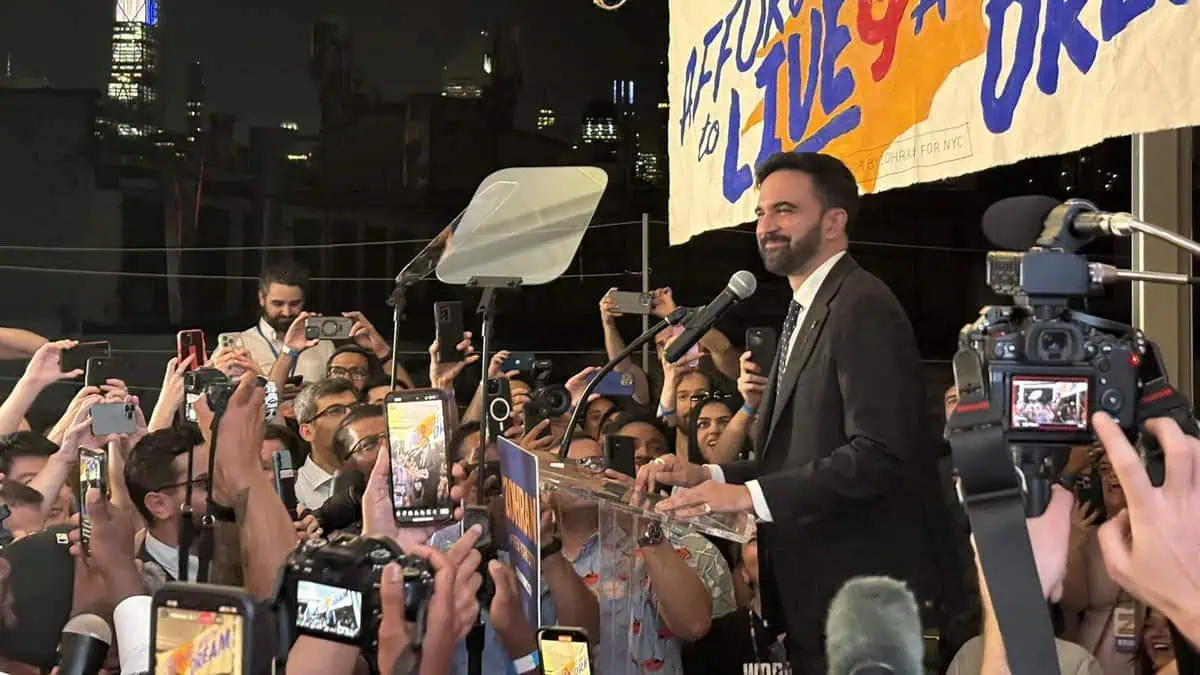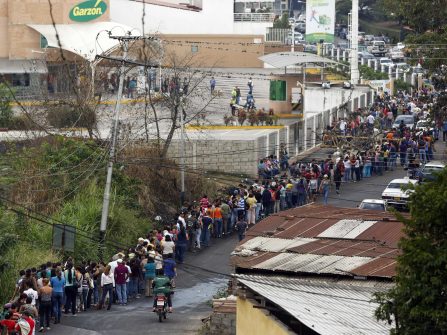
the staff of the Ridgewood blog
New York NY, in a recent CNN interview, New York City mayoral candidate Zohran Mamdani faced tough questions from host Abby Phillip about his controversial proposal for government-owned grocery stores. The exchange was a trainwreck, exposing the flaws in Mamdani’s plan to create five city-run stores across NYC’s boroughs. Critics, including Phillip, challenged the idea’s feasibility, pointing to real-world failures and Mamdani’s apparent misunderstanding of basic economics. Here’s why his vision for “cheaper groceries” is sparking skepticism and what it means for New Yorkers in 2025.

photo food line in Venezuela
Mamdani’s Plan: Government-Run Groceries to Fix Food Deserts
Mamdani, a Democratic socialist and frontrunner in NYC’s mayoral race, proposes opening one city-owned grocery store in each of NYC’s five boroughs to address food insecurity and high prices. In his CNN interview, he argued that these stores would offer “cheaper groceries” by eliminating profit motives, avoiding rent and property taxes, and leveraging wholesale pricing. He cited a Chicago feasibility study to support his plan, claiming it’s a practical solution for urban areas like New York, where over 30% of some neighborhoods face food insecurity.
But when pressed by Abby Phillip on why the government should run grocery stores instead of supporting private businesses, Mamdani’s response was vague and unconvincing. He leaned on the idea that food is a “necessity” and public options are viable, but failed to address operational challenges or provide concrete details.
Keywords: Zohran Mamdani grocery stores, NYC government grocery plan, food insecurity solutions, public grocery stores, urban food deserts
Abby Phillip’s Pushback: Real-World Failures Expose the Flaws
Phillip didn’t let Mamdani’s idealism slide. She pointed to Kansas City, where a government-run grocery store has struggled with chronic issues like crime, inventory shortages, and financial losses, teetering on the brink of closure. This example underscores a key critique: governments often lack the efficiency and market discipline to run retail effectively. Private grocery stores operate on razor-thin margins of 1-3%, and city-run stores would face similar pressures—plus higher labor costs from public-sector benefits.
Mamdani’s response? He sidestepped the Kansas City example, offering no counter to its failures. Critics argue this highlights a broader issue: his plan assumes government can outperform private businesses without addressing logistical realities like supply chain management or shoplifting, which has plagued NYC retailers.
The Funding Fiasco: Mamdani’s Math Doesn’t Add Up
One of the most damning critiques of Mamdani’s plan is its shaky financial foundation. He claims the $60 million initiative would be funded by redirecting subsidies from NYC’s Food Retail Expansion to Support Health (FRESH) program, which he mistakenly believes provides $140 million to “corporate grocery stores.” In reality, FRESH has only cost the city about $30 million in tax breaks over its lifetime, averaging $3.3 million annually. It would take 42 years to reach the $140 million Mamdani cites—a glaring error that suggests he misread a government website mistaking private investment for public spending.
Without this nonexistent funding, Mamdani’s plan risks running at a loss, potentially draining NYC’s budget. Critics warn that “cheaper” groceries could lead to overwhelmed stores, empty shelves, and unsustainable subsidies, mirroring Soviet-era shortages or Venezuela’s failed government markets.
Why It Matters: A Risky Experiment for NYC
Mamdani’s proposal has sparked heated debate. Supporters, including some food policy experts, argue it’s a bold fix for food deserts, citing existing models like military commissaries or small-town stores in St. Paul, Kansas, and upcoming projects in Atlanta. A poll by the Climate & Community Institute and Data for Progress found 66% of New Yorkers support municipal grocery stores, driven by concerns over rising food costs.
However, opponents—including business leaders like Gristedes owner John Catsimatidis—call it “radical socialism” that could devastate private grocers and bodegas. Catsimatidis even threatened to close his stores if Mamdani wins, fearing unfair competition from subsidized city markets. Others, like economist Ryan Bourne, argue government-run stores lack the market discipline to stay efficient, risking “bloated costs” and “empty shelves”.
The stakes are high. If Mamdani’s plan fails, it could strain NYC’s budget, disrupt local businesses, and exacerbate the very food access issues it aims to solve. His lack of practical experience—he’s never held a private-sector job—raises further doubts about his ability to execute such a complex initiative.
What’s Next for New Yorkers in 2025?
Mamdani’s CNN interview laid bare the challenges of his government-run grocery plan. While his focus on affordability resonates with voters frustrated by rising costs, the logistical and financial hurdles suggest a risky experiment. New Yorkers face a critical choice in the 2025 mayoral election: embrace Mamdani’s vision or opt for solutions that bolster private-sector efficiency.
For now, his proposal remains light on details, and his campaign’s silence on operational questions—like whether the city would build stores, lease them, or employ staff—only fuels skepticism. As the debate continues, voters must weigh whether this “public option” is a practical solution or a well-intentioned but flawed pipe dream.
Source: CNN interview with Zohran Mamdani, supplemented by insights from Construction Coverage, The Washington Post, and Fox Business.
Tell your story #TheRidgewoodblog , #Indpendentnews, #information, #advertise, #guestpost, #affiliatemarketing,#NorthJersey, #NJ , #News, #localnews, #bergencounty, #sponsoredpost, #SponsoredContent, #contentplacement , #linkplacement, Email: Onlyonesmallvoice@gmail.com

Lightweight
Who are these people supporting him?
Nothing a visit from the national guard can’t solve, if necessary.
Democrats have a learning disability